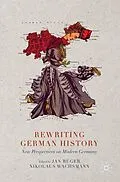Rewriting German History offers striking new insights into key debates about the recent German past. Bringing together cutting-edge research and current discussions, this volume examines developments in the writing of the German past since the Second World War and suggests new directions for scholarship in the twenty-first century.
Autorentext
Geoff Eley, University of Michigan, USA Lynn Abrams, University of Glasgow, USA Astrid Swenson, Brunel University, UK Tom Neuhaus, University of Derby, UK Elizabeth Vlossak, Brock University, Canada Rachel G. Hoffman, King's College, Cambridge, UK Victoria Harris, Birkbeck, University of London, UK Hugo Service, University of York, UK Bernhard Fulda, Sidney Sussex College, Cambridge, UK Hester Vaizey, Clare College, Cambridge, UK Stefan Ihrig, Van Leer Jerusalem Institute, Israel Bradley W. Hart, California State University, USA Christian Goeschel, University of Manchester, UK Bianca Gaudenzi, Wolfson College, Cambridge, UK David Motadel, Gonville and Caius College, Cambridge, UK
Inhalt
Editors' Preface; Jan Rüger and Nikolaus Wachsmann 1. Crossing the North Sea - is there a British Approach to German History?; Geoff Eley PART I: THE LOCAL NATION 2. Cologne Cathedral as an International Monument; Astrid Swenson 3. Germany's Boundaries and the Politics of Defeat: Heligoland, 1918-1933; Jan Rüger 4. Cosmopolitan Highlanders: Region and Nation in Anglo-German Encounters in the Himalayas, 1903-1945; Tom Neuhaus 5. The 'Cleansing' of Culture in Germany's Lost East after the Second World War; Hugo Service 6. Traitors, Heroes, Martyrs, Victims? Veterans of Nazi 'Forced Conscription' from Alsace and Moselle; Elizabeth Vlossak PART II: CULTURE AND SOCIETY 7. The Age of Assassination: Monarchy and Nation in Nineteenth-Century Europe; Rachel G. Hoffman 8. Finding the Female Self: Women's Autonomy, Marriage, and Social Change in Nineteenth-Century Hamburg; Lynn Abrams 9. Beasts in Human Clothing? Pimps, Moral Panics, and the German Underworld; Victoria Harris 10. Myth-making in Hitler's Shadow: The Transfiguration of Emil Nolde after 1945; Bernhard Fulda 11. East German Perspectives on Continuity and Change across the Caesura of 1989; Hester Vaizey PART III: THE PECULIARITIES OF NAZI GERMANY 12. Justifying Genocide in Weimar Germany: The Armenian Genocide, German Nationalists, and Assassinated Young Turks, 1919-1923; Stefan Ihrig 13. Interwar Britain and German Racial Theory; Bradley W. Hart 14. The Cultivation of Mussolini's Image in Weimar and Nazi Germany; Christian Goeschel 15. Dictators for Sale: The Commercialisation of the Duce and the Führer in Fascist Italy and Nazi Germany; Bianca Gaudenzi 16. Veiled Survivors: Jews, Roma and Muslims in the Years of the Holocaust; David Motadel 17. The Nazi Concentration Camps in International Context: Comparisons and Connections; Nikolaus Wachsmann
